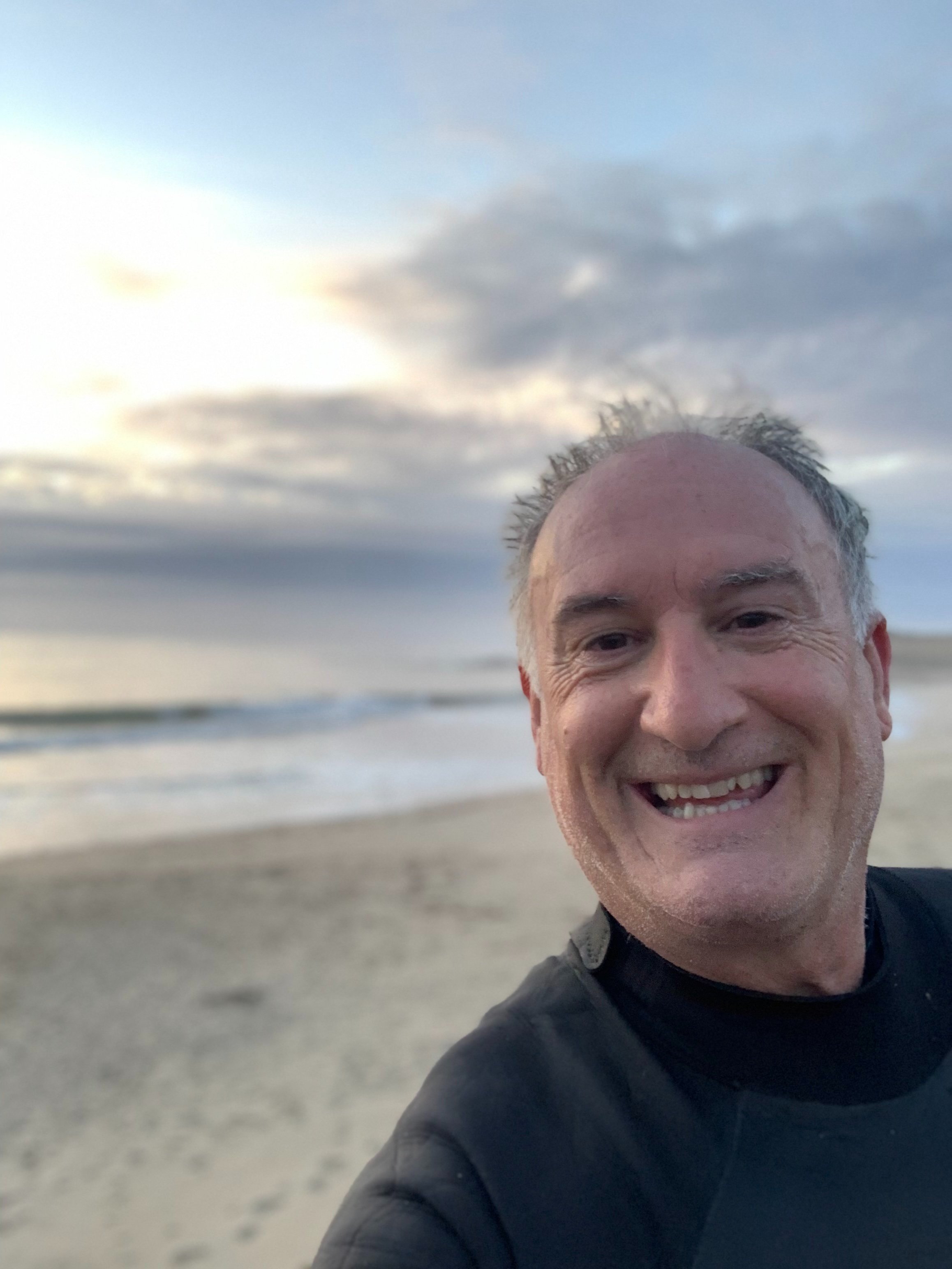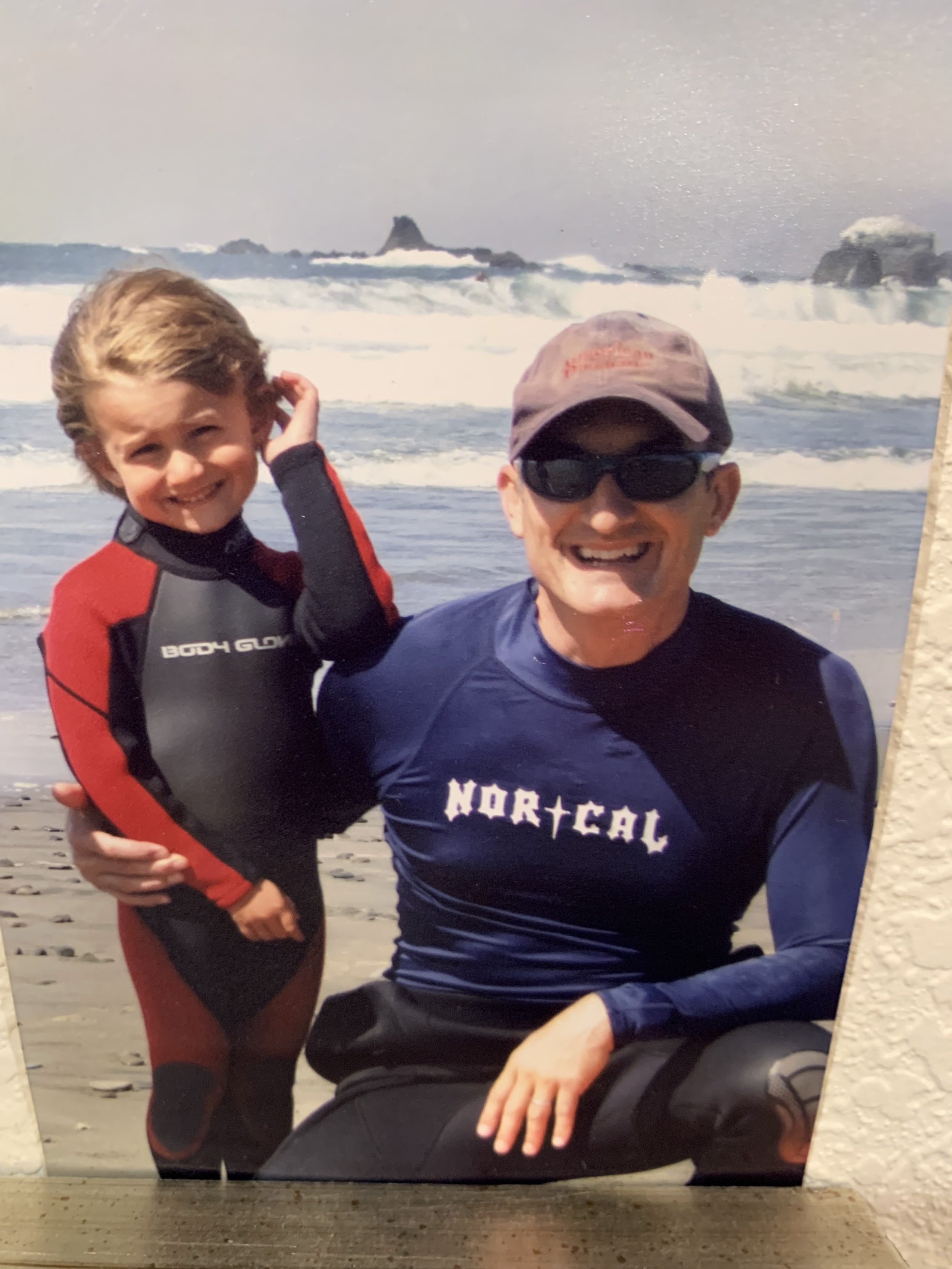
KEVIN, 58 | OCEAN BEACH, CA
“I've had to learn, to teach myself to slow down, to map what my body is responding to in this oceanic power ...”
The oceanic matters to me in the kind of Jungian sense of something much larger than any of us can comprehend. Being able to lose myself and my worries and my anxieties and my individual concerns – “Am I doing it right? Am I living this life right?” — are eclipsed by the ocean.
And as my son and I discuss every time we’re out in the water, every time in the waves you are re-educated that the ocean is so much bigger and more powerful than you, and so it's this humbling experience: like this is way bigger than my little scheme of thinking I'm in control.
So I've had to learn, to teach myself to slow down, to map what my body is responding to in this oceanic power. Because when I was young, when I was 28, it didn't matter. I could just will myself to do all that and continue the guise of being in control and being safe and being able to manage myself and go for thrills and drop in on things that I shouldn't be dropping in on and get tumbled and sent down 10 feet and not know which way is up.
And by not owning up to the reality of that, I think I was putting myself in an imbalanced place. And now that I'm older and my body can't do that anyway, I'm learning so much more to respond to the power of the ocean by really doing what I need to do, which isn't what I used to do, which was just override, override, override.
It's a giant teacher, helping me trust that I belong, that I can go into it and be myself with this great force and power. Like I have cold-water asthma, and if I'm breathing hard, I have to stop and get my breath.
And in my life, when I'm smart enough to recognize that that's happening, that is when I'm smart enough to recognize that the relationships I'm in with people are kind of oceanic; they have a thing that I can't control, and they have a power that isn't visible to me until it's visible to me, but usually it's only visible when I'm 10 feet under the water and like, ‘Oh shit.’ Like with my partner, not acknowledging that something has impacted her so much that for me to bring it up in a non-sensitive way is going to unleash that in her, and then it's going to be bigger than what I can handle, right?
With my daughter, same thing: if I try to be the dad to the kindergartner during the divorce I'm going to blow it, because it's all about agency for her, and it's all about her making choices and showing me that she was smart enough to think through these things, and even if I disagree, it's not a panel where I engage with her intellectually on whether or not it's the right thing.
These are all forms of control that I just wasn't cultured into, you know, probably because my family was such chaos; I had two big personalities, my mom and my dad and, “boom, boom, boom!” and three other siblings. Like, just huge, mythic kind of experiences.
With my son, we were boogie boarding ever since he was tiny. There’s this picture of him in his wetsuit, he’s got a little baby body in a wetsuit, and he's got blonde hair, and he's standing on top of a maternal inflatable pad, literally that was used for his birth at CPMC, and he's pretending to surf.
He got really into riding waves, and he told me recently when we stopped at Pigeon Point on a big drive down in Santa Cruz, he said, ‘Dad, I just want you to know that I need things for me, and I know you're the one that turned me on to the ocean, but I can't do it with you right now, because it has to be mine now, and there will be a time when I can share it back with you, but not now.’
And that just made so much sense to me, you know? ‘Just give me time and we will reconnect. I don't need that father's shadow over me. And I know the ocean is your thing, but it's mine too, and I need it to be on my terms.’
I’ve been teaching for 25 years at Stanford, kind of always chasing that gold ring of ‘performance guy’: recognition, reviews, acknowledgment, grants, what are you working on next? You know, how good is it? I'm now an empty nester. My kids are moved out and kind of on their way, and I have a different sense of maybe what I want from this life.
So I'm wrestling a little bit with finding a balance of relations, like rich relations with people and work.
Grief has become a big narrative for me and exploring and understanding grief in a much deeper framework than I had been used to. And I've attended a bunch of workshops. Angela Hennessy, an artist over at CCA in Oakland, also African American, brought African American grieving ritual knowledge to a session that I did with them. And water was huge. And the pastor, Marvin K. White, was talking about how sound travels so quickly through water because of the way the molecules are connected. So in his sense, when you were trying to get deeper to your ancestors, being in the water made sense, because they would hear the message much faster. So turns out there are all these water-based rituals of healing and grief that are from the African American communities and diaspora. So I've done some grief writing workshops at Stanford now, based on what I've learned.
And Lohla Amira from South Africa came to Brazil and did this. She was asking, because of the slave trade, not only how were humans harmed, but how was the ocean harmed by this trafficking, by this trade? And so she went into the water in colonial Bahia and waded in and was with the elders and the elder women. And there's a whole beautiful video at the de Young. It's still there, I think, and there's a whole ritual with salt and salt water and tapestries and healings. So those water rituals that they offered have opened up some things in my own writing. And I’ve carried it forward with some Writer’s Studio grief writing workshops for students at Stanford.
So that's another way the ocean’s become really important to me. So I have done a couple rituals where I took my Christmas wreaths and bay leaves and berries and things that reminded me of my kids, and I went down to the waves, and I made a boat and cast it into the waves and let the waves take it away. Exactly in my usual surf spot on Linda Mar Beach. It now has extra significance for me there.
I’ve talked mostly about the oceanic, overwhelming experience that is beautiful, but also, like, full of dark. Then there’s also the joy. Like today dropping in on this crazy right that just propelled me along this curl.
So that's another level of being in sync with something that has much more power than you have. And it's not destructive. It's not Vishnu, it's, ‘I'm in the wave, and I'm riding with it, and I'm part of it,’ and the power is way beyond anything I could come up with. And the thrill is through the roof!
And at mid life, when those things are not as easy to come by, and my body just can't really put myself in the places to do that stuff as much as it used to, and can't come out as unscathed, it's even more precious. And so the thrill of that is also a really big part of this for me.
The last wave I caught today when I dropped in, I didn't have any room to cut right or left, and it was freaky, because I was looking down, straight down the face towards the gravity center of the universe, like I was right on the axis, thinking there's a chance this will not end well! But I made it, and hit the bottom and the wave broke right behind my ass, and I was just laughing!
It’s Noah’s Rainbow — there's just no more life-thrilling thing than having just fucking escaped a nasty thing with this power. You know, like, ‘God bless: Someone must love you. Amazing. Something must love you.’ Yeah, so that's the other part of all this.”


